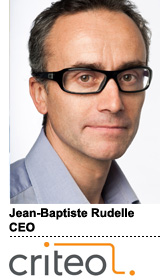 Criteo has lowered its full-year revenue guidance as it seeks to evolve its pricing model, the company said during its Q2 earnings call Wednesday.
Criteo has lowered its full-year revenue guidance as it seeks to evolve its pricing model, the company said during its Q2 earnings call Wednesday.
Other headwinds, like mobile privacy policies and GDPR regulations, did affect Criteo’s revenues as dramatically.
The company initially anticipated growth between 3% to 8% and now expects growth to be flat. Its revenue declined 1% YoY, from $542 million to $537 million.
CEO JB Rudelle attributed the gloomier forecast to revenue fall-off as Criteo transitions from a cost-per-click retargeting specialist to subscription-based software.
For the first time this year, many retailers began working directly with brands for online advertising deals, Rudelle said.
“It’s a different model where instead of a full solution with a sales team we became a tech provider and let [retailers] do their own monetization,” Rudelle said. “We are company that used to sell clicks and now it’s a platform SaaS provider. Adjusting to this pricing takes time.”
Rudelle also said slower-than-expected hiring has brought down the expected number of new merchants and product sales.
“We want a more balanced business with a broader portfolio of products,” Rudelle said. “As we move from a point solution to a strategic platform for clients, we should see other products, then retargeting, be a key part of the portfolio.”
Criteo’s non-retargeting products grew 72% year over year but still account for only 6% of the business. Those products include a data onboarding and match rate solution, customer prospecting and the retailer sponsored products ads it developed from the $250 million acquisition of HookLogic two years ago.
Criteo added a future non-retargeting product with the acquisition of Storetail, a French ecommerce ad tech startup focused on bringing retail trade marketing dollars online, for an undisclosed but small price, the company announced on the call Wednesday.
The French startup had raised about $8 million and boosts Criteo’s headcount by 60.
Criteo had predicted its other headwinds.
The Apple ITP policy restricting tracking for its Safari browser and iOS users was a 14% drag on growth, in line with Criteo’s expectations earlier and not factoring into the downward revenue forecast.
Rudelle said GDPR is not a headwind and that since the law went into effect the company has been assured by the French data protection authority that it meets the law’s standards with its policy of alerting site visitors to tracking and then registering as consent any browser activity, like continuing to scroll or clicking on a page.
Some in the industry think Criteo could be exposed to EU fines because of its consent policy, and those doubts have made Criteo a popular target for short-sellers of its stock.
Criteo shares dropped more than 20% following its earnings report.
This post was syndicated from Ad Exchanger.


More Stories
Daily Wire Welcomes Perplexity to Advertise on The Ben Shapiro Show
Here’s the Roundup for the Week Ending March 7
Aflac’s Dan Amos Reveals How He’s Successfully Held Onto the CEO’s Job for 35 Years